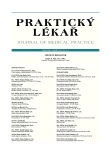-
Medical journals
- Career
The health risk of an excessive intake of fructose
Authors: K. Papežová; V. Mlčochová; H. Matějová
Authors‘ workplace: Ústav preventivního lékařství ; Přednostka: prof. MUDr. Zuzana Brázdová, DrSc. ; Lékařská fakulta Masarykovy Univerzity, Brno
Published in: Prakt. Lék. 2011; 91(7): 385-388
Category: Reviews
Overview
A relentless increase in the number of people who are overweight or obese has been witnessed recently, which is related to the rise of many illnesses, especially type 2 diabetes and metabolic syndrome.
The most frequent cause of being overweight and/or obese is a positive energetic balance; where macronutrients play a key role. Every single person has different energetic needs for enabling suitable functioning of the body and different energetic needs for performing physical activity. Energy, which is taken in that is excess to the needs of human organism, is mainly received in the form of
– polysaccharides,
– fats, and
– alcoholic drinks.
Recently, attention has focused on carbohydrates that have been added to foods and drinks but which are not natural components of human diet. According to the studies available, the excessive intake of carbohydrates, especially fructose, is the cause of many illnesses.Key words:
carbohydrates, fructose, health risks, obesity, metabolic syndrome.
Sources
1. Bocarsly, M.E., Powell, E.S., Avena, N.M. High-fructose corn syrup causes characteristics of obesity in rats Increased body weight, body fat and triglyceride levels. Pharmacol. Biochem. Behav. 2010, 97, p. 101-106.
2. Dekker, M.J. Fructose: a highly lipogenic nutrient implicated in insulin resistance, hepatic steatosis, and the metabolicsyndrome. Am. J. Physiol. Endocrinol. Metab. 2010, 229, p. 685-694.
3. Ferder, L., Ferder, M.D., Inserra, F. The Role of High-Fructose Corn Syrup in Metabolic Syndrome and Hypertension. Curr Hypertens Rep, 2010; 12: p. 2105-2112.
4. Holeček, M. Regulace metabolismu cukrů, tuků, bílkovin a aminokyselin. Praha: Grada Publishing, 2006, s. 112-113.
5. Johnson, R.H. Weighing in on added sugars and health. J. Am. Diet. Assoc. 2010; 110, p. 1296-1299.
6. Kazdová, J. Negativní důsledky konzumace fruktózy při diabetu a metabolickém syndromu Lékařské listy, 2009, 4.
7. Livesey, G. Fructose, obesity, and related epidemiology. Crit. Rev. Food Sci. Nutr. 2010, 50, p. 26-28.
8. Lustig, R.H. Fructose: metabolic, hedonic, and societal parallels with ethanol. J. Am. Diet. Assoc. 2010, 110, p. 1308-1321.
9. Soleimani, M. Dietary fructose, salt absorption and hypertension in metabolic syndrome: towards and new paradigma. Acta. Physiol. (Oxf). 2011, 201(1), p. 55-62.
10. Škrha, J. Diabetes mellitus 2. typu jako subklinický zánět. Čas. Lék. čes. 2010, 149, s. 277-281.
11. Weir, M.R. Dietary fructose and elevated levels of blood pressure. J. Am. Soc. Neph. 2010, 21, p. 1416–1417
Labels
General practitioner for children and adolescents General practitioner for adults
Article was published inGeneral Practitioner

2011 Issue 7-
All articles in this issue
- Cystic tumours of the pancreas – an up-to-date review
- Prenatal diagnostics of the most frequent chromosomal aberrations
- Measuring older peoples attitudes to ageing
- Assessment of compensation for pain and worsening of social assertion
- Acute endoscopic treatment of upper gastrointestinal bleeding: twenty-one-years experience
- Caregiver role strain from the view of home care nurses
- Current possibilities of publishing the results of nursing research
- Lapatinib in the treatment of advanced breast cancer
- Nasal-specific provocation test in diagnosis of occupational allergic rhinitis
-
Basics of cognitive, affective and social neuroscience:
VII. Lying - The health risk of an excessive intake of fructose
- General Practitioner
- Journal archive
- Current issue
- Online only
- About the journal
Most read in this issue- Cystic tumours of the pancreas – an up-to-date review
- Prenatal diagnostics of the most frequent chromosomal aberrations
- Acute endoscopic treatment of upper gastrointestinal bleeding: twenty-one-years experience
- The health risk of an excessive intake of fructose
Login#ADS_BOTTOM_SCRIPTS#Forgotten passwordEnter the email address that you registered with. We will send you instructions on how to set a new password.
- Career

